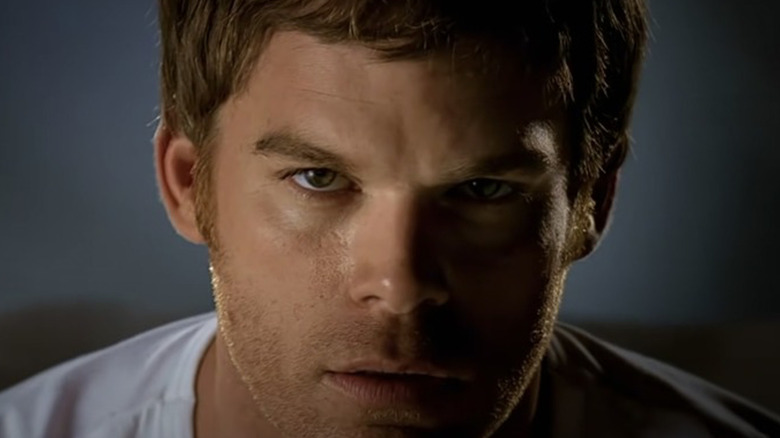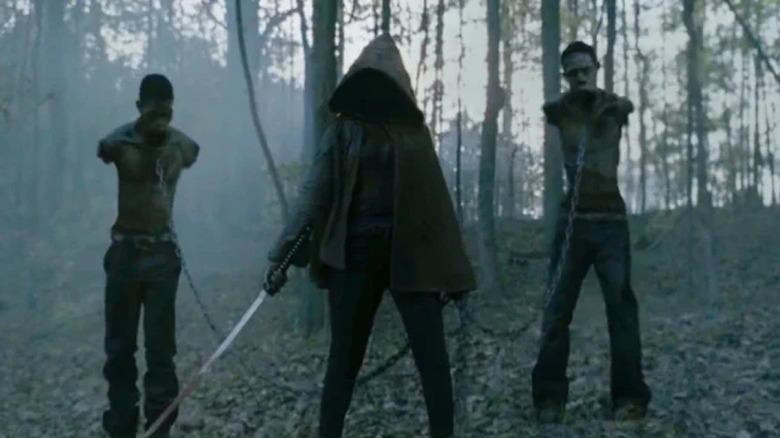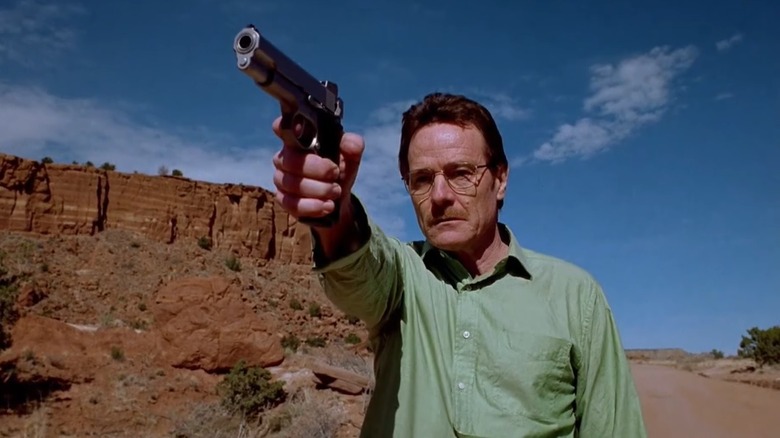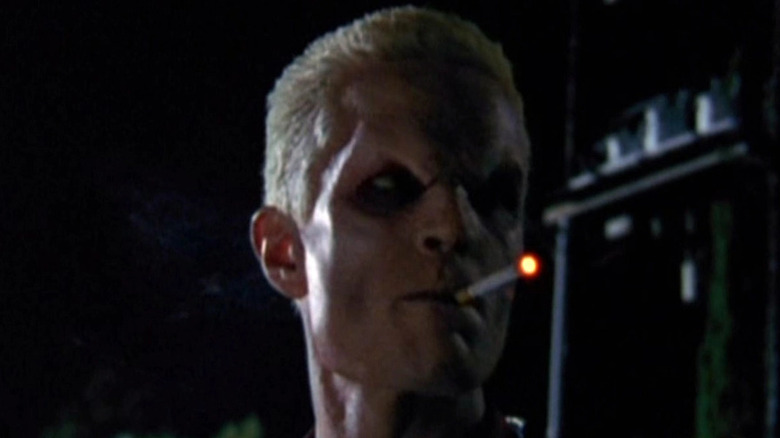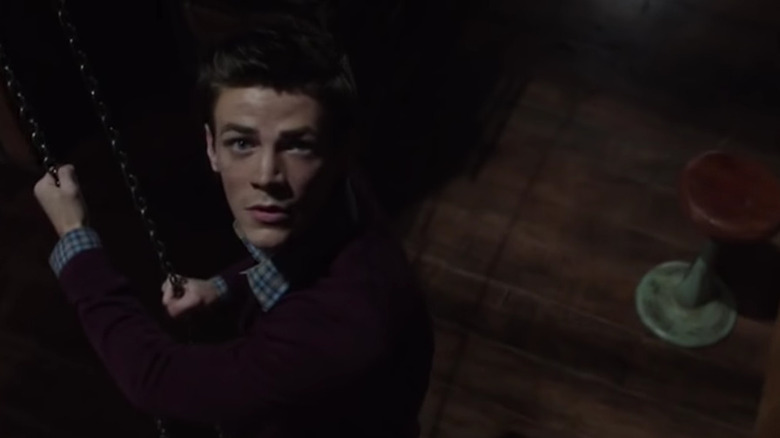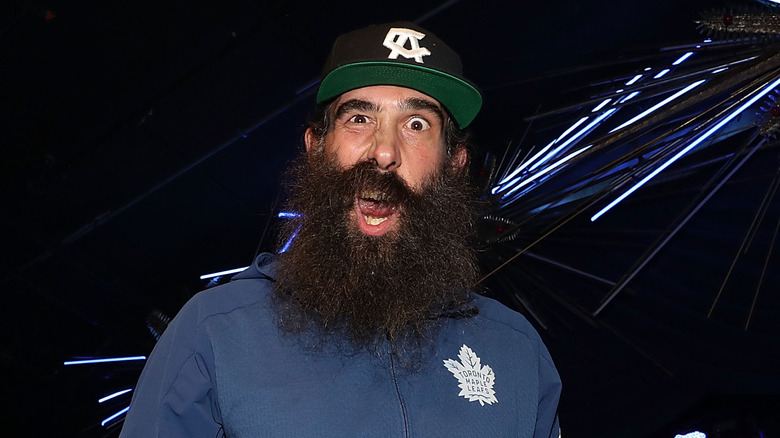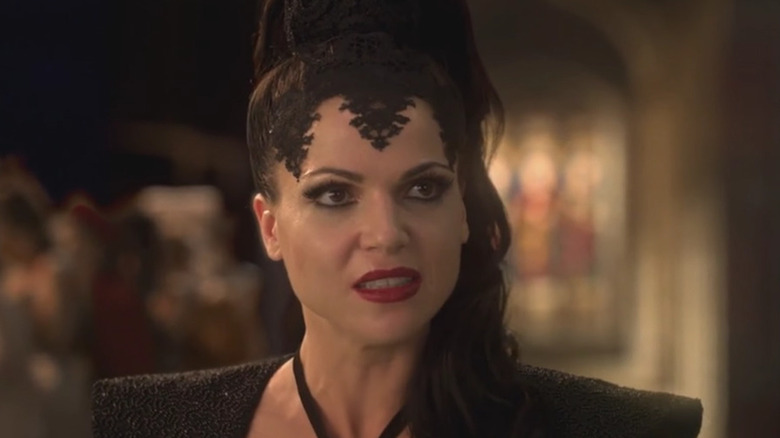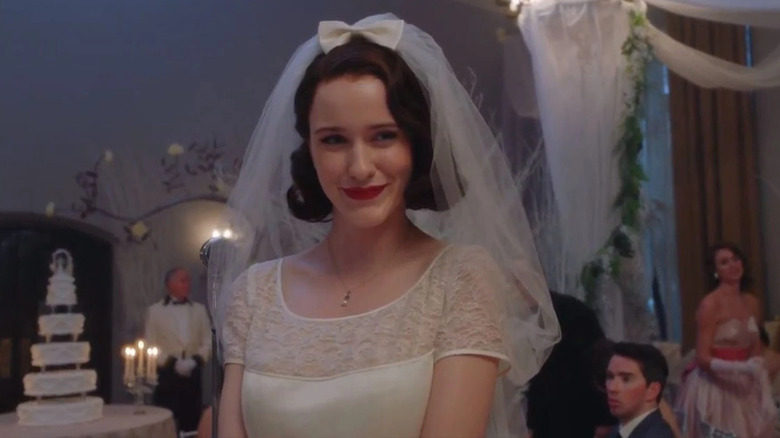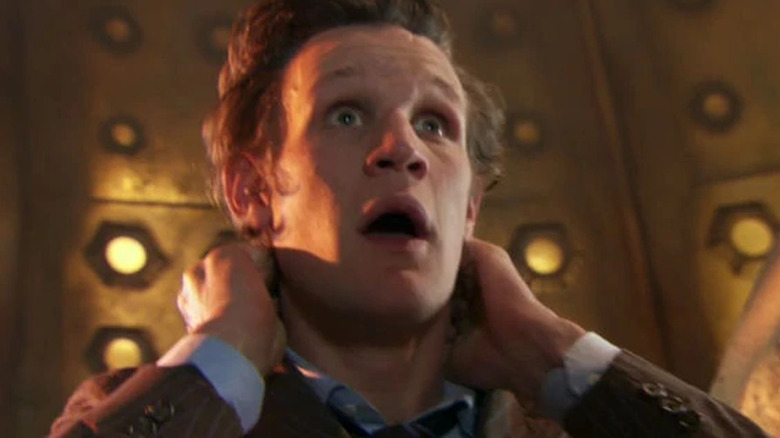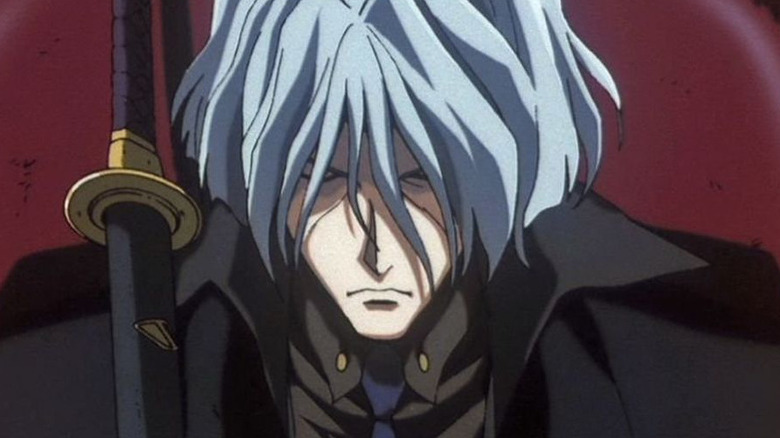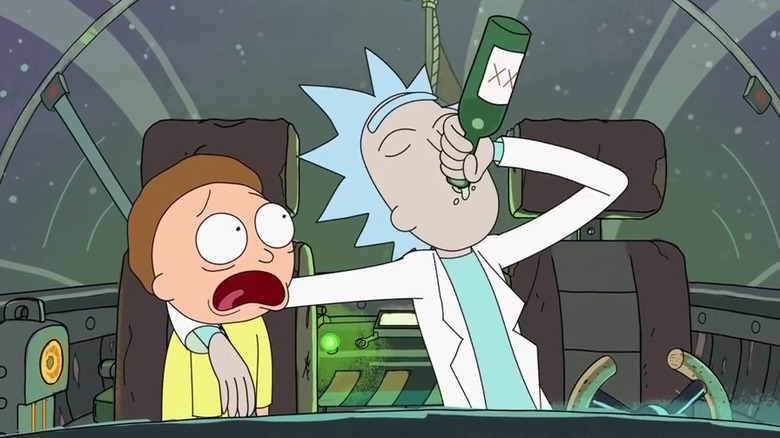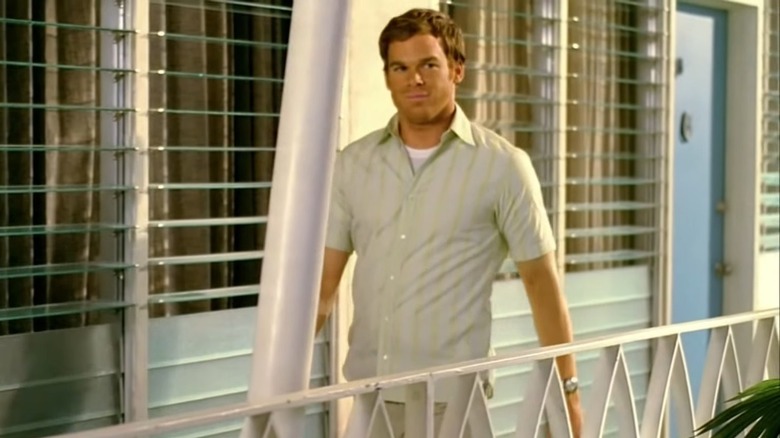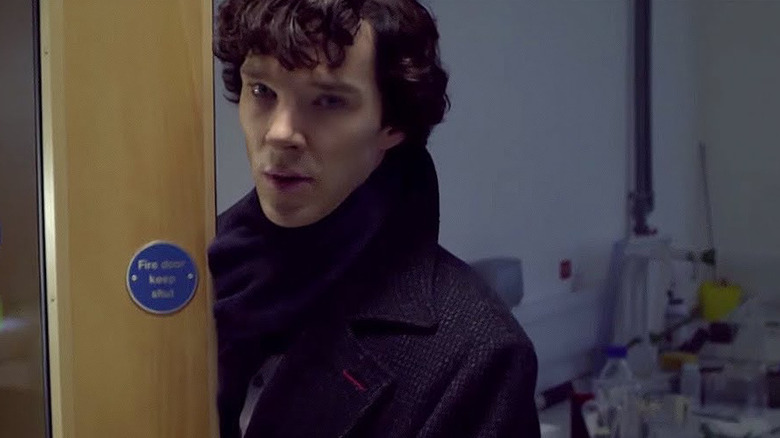The Best TV Character Debuts In Popular Shows
They say that first impressions are everything, which couldn't be more true for fictional television characters. When introducing a new character — especially a main or major one — sticking the landing on their first appearance is everything.
While learning everything about a character right away is unnecessary, a basic introduction to their core personality is an absolute must. If you fail to hook your viewers within the first couple of episodes of your show, keeping them on board will prove a challenge. It's also important if their eventual character arc leaves them in a radically different place mentally and emotionally from where they started.
Be it a suave ad executive like Don Draper or a post-apocalyptic policeman like Rick Grimes, understanding motivation is paramount to audience investment. If you are going on a journey with a character for multiple episodes, it's essential viewers are able to understand them quickly. These are some of the best examples of television characters whose inaugural appearances succeeded at establishing their personalities and respective modus operandi.
Michonne - The Walking Dead
For over a decade "The Walking Dead" has been pop culture's one-stop shop for zombie kills and emotional devastation. Based on the Robert Kirkman penned comic book of the same name, the show definitely took several liberties with its source material. Over the course of its run, some characters were omitted, changed, and taken in radically different directions from the comics. However, one character that lived up to their comic counterpart was Michonne — played by Danai Gurira. When it was announced that the character would be making their debut in the show's third season, fans rejoiced, via Entertainment Weekly.
Well before the character arrived on the show, Michonne had already built up a positive reputation from the comics as one of the series' most engaging figures. She makes her debut in the finale of the show's critically divisive but still entertaining Season 2. After being left behind during the fall of Herschel's farm, Andrea (Laurie Holden) finds herself limping through the woods. Just as she is about to meet her end at the hands of some hungry walkers, Michonne arrives and quickly slices them up with her sword.
In this appearance, the character's face is kept in shadow, played in this one appearance by a stand-in. Once Gurira made her formal introduction in the following season, she would quickly become a celebrated fan-favorite hero on "The Walking Dead."
Walter White - Breaking Bad
To say that "Breaking Bad" was a widespread phenomenon would be a gross understatement. Earning wide praise from fans and critics during its run from 2008 to 2013, it generated a vast culture of merchandise, watch parties, and even contributed to the trend of binge-watching. The story of Walter White (Bryan Cranston) and his journey from science teacher to meth kingpin was must-see television, and the show wasted very little time in drawing in viewers with its first scene, which introduced Walter White.
We open on a dilapidated RV rocking across the desert, being driven by a nearly naked Walter. The RV is trashed, full of leaking chemical fluids, and complete with three unconscious men, one later revealed to be Jesse Pinkman (Aaron Paul). Upon crashing the RV, Walter exits and, in a panic, grabs a loaded gun and a video camera. He records a quick and very anxiety-ridden video that he uses to apologize to his wife and son. Following this recording, he readies himself and walks to the middle of the road to face the approaching police sirens. Walter then holds the gun up, pointing it down the road and directly into the camera.
It's not only a wonderful introduction to Walter's character but an exceptional example of how to hook your audience quickly and effectively.
Spike - Buffy the Vampire Slayer
The runaway success of the character of Spike is one of the least intentional developments in TV history. First introduced in Season 2 of "Buffy" as a villain of the week, the character would eventually be slotted into primary antagonist status out of nothing more than necessity.
The original plan for the show's second season was to follow up on the protegee of the Season 1 baddie, the Master, who was known as the Anointed One. Unfortunately, the concept of the character being an immortal child was no longer sustainable due to the actor — Andrew J. Ferchland — hitting puberty. He would be quickly written off, and in his place, Spike, and his creepy confidant Drusilla, would become Season 2's main driving forces.
Spike is introduced in the season's third episode, "School Bad," when he causes trouble for Buffy and the Scoobies. His first scene, in which he rams his car into the Sunnyvale sign and lights up a cigarette, definitely sets the stage for his character. Despite having a unique and complex arc told over the course of both "Buffy the Vampire Slayer" and "Angel," Spike never loses his original bad boy swagger. It's a testament to just how good James Marsters was in the role that he is still beloved and quoted by fans to this day.
Barry Allen - Arrow/The Flash
In the mid-2010s, the Arrowverse only consisted of two shows — "Arrow" and "The Flash." However, before the Scarlet Speedster would make his presence felt on Tuesday nights, he was introduced in Season 2 of "Arrow." The show's second year would see many changes and developments in the story of Oliver Queen, both visually and tonally. These included reducing the emphasis on gritty realism while shifting the show's focus to featuring larger-scale comic book-inspired elements.
This would be cemented with the introduction of Central City CSI Barry Allen, played by Grant Gustin. Gustin, who was fresh off roles in "Glee" and "CSI: Miami," as noted by The Hollywood Reporter, was subject to some mild scrutiny from hardcore comics fans. Could Gustin pull off the charm, humor, and gravitas associated with the character of Barry Allen, aka the Flash?
After his introduction in the Arrow episode "The Scientist," the answer to that question was a resounding yes. From his first moments on screen, Gustin immediately encompassed the humor and affable charm of Barry Allen, much to everyone's delight. This episode would also serve as a backdoor pilot for the eventual spin-off series that Gustin would helm as the lead. While both "The Flash" and the Arrowverse have had their ups and downs, the quality of Gustin's performance and appreciation for the role has never wavered.
Brodie Lee - All Elite Wrestling
Professional wrestling is one of the strangest forms of episodic television, with stories often spanning multiple years and sometimes even decades. One of a pro wrestler's most important moments is their first onscreen appearance, which usually occurs to immense fanfare. However, during 2020, with crowds absent from weekly wrestling shows due to COVID-19, many debuts lacked a certain grandeur. There were exceptions to this, such as the first appearance of Brodie Lee in All Elite Wrestling (AEW). After being released from the WWE in 2019, via Mostly Wrestling, many fans speculated when Lee — formally known as Luke Harper — would appear again.
When the Dark Order first arrived in AEW, they were met with much criticism from fans on Reddit and other forums. This would change when their de facto mouthpiece, Evil Uno, began teasing the arrival of the Exalted One. After much speculation and theorizing by fans and online commentators, some suggesting it could be Matt Hardy, the Exalted One finally arrived. Confirming his presence through an ominous video package, Brodie Lee would quickly make himself known by decimating the tag team SCU. It's a grand debut that means all the more now, considering that Brodie Lee died in December 2020. His run, though brief, was immensely entertaining, and it all kicked off with an epic first appearance.
The Evil Queen - Once Upon a Time
From the beginning, "Once Upon a Time" was a curious episodic oddity, but fantasy fans quickly embraced the ingenious reimagining of classic fairy tales and Disney characters. The show focused on Emma Swan (Jennifer Morrison), her son Henry (Jared S. Gilmore), and their life in Storybrooke, Maine. The hook, however, is that all of Storybrooke's residents are actual fairy tale and fantasy characters who have lost their memories due to the machinations of the Evil Queen.
The show's seven-season run was packed to the brim with memorable characters and moments. However, the figure that "Once Upon a Time" fandom ended up adoring most was the Evil Queen, aka Regina Mills (Lana Parrilla). This is quite ironic, as Regina is quite despicable in her introduction in the pilot and throughout Season 1.
That introduction occurs in the opening scene of the show's inaugural episode, where viewers are shown a recap of the "Snow White" fairytale, complete with Snow White and Prince Charming's grand wedding. However, the Evil Queen soon arrives to make a threatening vow to the new husband and wife. While she will allow them to enjoy their special day, she promises that soon everything they know and love will be gone forever! This makes for a stellar introduction to one of modern television's finest villains who, through an amazing multi-season arc, would become a memorable anti-hero.
Midge Maisel - The Marvelous Mrs. Maisel
"The Marvelous Mrs. Maisel" has quickly become one of Amazon Prime's flagship shows, right alongside other hits like "The Boys." The show is a magnificent look at the comedy scene of the 1950s and '60s interjected with a modern flair. The show is a buffet of well-timed comedic performances turned in by veteran character actors and fresh-faced young talent. However, the show is not without legitimate dramatic moments and is never afraid to show the cost of chasing one's dreams. At the center of everything is the eponymous Midge Maisel (Rachel Brosnahan), the loving housewife turned touring foul-mouthed comedian.
It's worth noting that back in 2017, "The Marvelous Mrs. Maisel" was among several pilots that Amazon took a chance on. However, it soon became apparent that fans and critics wanted more, as indicated by an early review from Vulture, and based on its opening moments it's not hard to see why. From her opening scenes, Rachel Brosnahan gets to demonstrate her broad range of comedic capabilities — both verbal and physical. From flashbacks to her college days to her hilarious wedding speech, in short succession, she endears viewers to Midge. It's honestly a no-brainer. When your lead is going to be a comedian, you want to showcase their comedic ability quickly, and "The Marvelous Mrs. Maisel" nails it.
The 11th Doctor - Doctor Who
We could make a case here for many of the first appearances for the dozen-plus actors that have played Doctor Who. There's the somber transition from Tom Baker to Peter Davison or the more recent change from Peter Capaldi to Jodie Whitaker. However, no change in modern "Doctor Who" history had as much riding on it as the transition from David Tennant to Matt Smith. When it was announced that Tennant's acclaimed run as the Tenth Doctor would end, it sent shockwaves through the fandom. Beyond that, when it was revealed that Matt Smith — the youngest actor to play the role yet — would be taking the reins, the internet went into red alert, as remembered by The Guardian.
Despite hesitation from fans, Smith would endear himself to viewers from his first appearance. At the conclusion of Tennant's final episode, "The End of Time," Doctor Who regenerates into the version played by Smith — causing the TARDIS to catch fire! He crashlands in the backyard of young Amelia Pond, which is where we pick up with him in "The Eleventh Hour." In one episode, Smith established everything that would make his Doctor great, including his manic energy and penchant for stirring oration. The first of his epic speeches serves as one of the best arrival moments for any Doctor, which is capped off his simple statement, "Hello ... I'm the Doctor." It's a level of quality that wouldn't waver from Smith's first appearance in 2010 to his farewell in 2013.
Vicious - Cowboy Bebop
Sometimes less is more, and occasionally a character's introduction just needs to provide the barest of minimums to hook the viewer. Vicious (Skip Stellrecht) from "Cowboy Bebop" is a perfect case study in keeping things simple while implying much more in order to hook the viewer. Despite appearing on screen very little throughout the critically acclaimed series' run, Vicious was a major lynchpin for Spike's character arc. It also helps that his introduction occurred in what many fans agree is the series' strongest session, "The Ballad of Fallen Angels."
Spike's past prior to his days aboard the titular Bebop is a recurring source of conflict throughout the series. It's in this early episode that his past comes for him with — as Samuel L. Jackson would say — "great vengeance and furious anger." Vicious, Spike's former Syndicate cohort, makes his presence felt immediately and as shockingly as possible through several fittingly violent acts. As he mercilessly carves his way through the episode, Vicious leaves a trail of blood and bodies in his wake, immediately letting viewers understand where his name comes from. His menacing presence is cemented when Vicious introduces himself to Faye (Wendee Lee), who proceeds to tremble in fear upon hearing his name.
Rick Sanchez - Rick & Morty
"Rick & Morty" has taken the world by storm since its debut in 2013, garnering a legion of very passionate fans and detractors. From merchandise to commercial tie-ins, the show has become an immense pop-cultural pillar of modern animation. It originally started life as a crudely animated parody of the characters of Doc Brown and Marty McFly from "Back to the Future" developed by Justin Roiland. These rough beginnings would evolve into the freeform and dysfunctional dynamic that the series would become known for.
The opening scene of the show's pilot episode serves as the perfect introduction to Morty (Justin Roiland) and, even more importantly, his grandpa Rick Sanchez (Roiland again). Rick is a character who has long ridden the fine line between a lovable protagonist and a chaotic (often self-serving) anti-hero, and his introduction could not be more appropriate.
Rick wakes up Morty in the wee hours of the morning to take him on a drunken spaceship ride. In the wrong hands, Rick is a character who could end up too unlikable or crude, but thankfully he is not. Through a combination of hilarious writing and the incomparable improv skills of Justin Roiland, the character is a slam dunk, and his manic energy is infectious from the first moments he appears on screen.
Dexter - Dexter Morgan
"Tonight's the night ... and it's going to happen again, and again". Those are the lines that opened the first episode of "Dexter" when it premiered in 2006. Based on the first of Jeff Lindsay's novels about the character — "Darkly Dreaming Dexter" — the show had to fill some fairly big literary shoes. A show as unique and as frequently violent as "Dexter" definitely necessitated a fittingly intense opening scene. Luckily, the show's creators knew exactly how to ingratiate the viewers to Dexter Morgan as quickly as possible.
The show's first scene starts with Dexter stalking someone we first assume to be an innocent victim, and the whole thing plays out like the opening scene of a horror film. The viewer is quickly misled into thinking Dexter is the villain. However, it's soon revealed that his victim in question isn't so innocent and has done some very horrific things to children. We then come to understand that Dexter is here to punish this man for what he's done using his very specific methods. In a genuinely remarkable introduction scene, the show is able to effectively establish Dexter, his code, and the kind of people he stalks in just a few minutes.
Sherlock - Sherlock Holmes
"Sherlock" is widely considered one of the best versions of Sir Arthur Conan Doyle's "Sherlock Holmes" stories. It's not hard to see why, thanks to its tight editing, modern pacing, and inventive reinterpretation of Doyle's classic novels. However, at the core of the show's immense popularity are its two leads — Benedict Cumberbatch and Martin Freeman as Holmes and Watson, respectively. The duo's chemistry is the main reason so many fell in love with the series from the very first episode.
In the inaugural "Sherlock" adventure "A Study in Pink," we meet Sherlock as he beats a dead body with a riding crop. Following his experiment and misinterpretation of the flirting of Molly Hooper (Louise Brealey), he meets John Watson and proposes they become flatmates. This follows his quick and almost machine-like deduction of Watson's veteran status and his current hunt for a place to stay.
Much like his literary counterpart, this version of Sherlock is brilliant, to the point that his deduction skills seem like magic. However, it's through these early moments we see that Sherlock is very smart, very succinct, and a bit socially oblivious, often to the point of hilarity. It's a grand introduction for a wonderful modern reinterpretation of a classic character and one that makes you want to see more of him.
